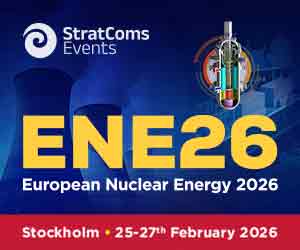Post - Articles
UK’s nuclear direction to be decided by Horizon bid
- 13 years ago (2012-09-25)
- Junior Isles
The future direction of Britain’s new generation of nuclear plants is to be decided soon, with three consortium’s bids for the Horizon group entering the final stage.

European Nuclear Energy 2026
Horizon, a joint venture between German utilities RWE and E.On which was put up for sale in March, has licences to build the first of Britain’s new generation of nuclear reactors in Anglesey and Gloucestershire.
The deadline for formal bids expires on 28 September, with a sale expected be decided by the end of the year.
Whichever consortium succeeds in its bid will have an initial advantage in the contest between three different reactor types to set their standard as the foundation for Britain’s new generation of plants.
“This decision is going to have big implications for the UK, in terms of inward investment, the impact on our manufacturing supply chain and competition,” said Richard Clegg, nuclear director at risk management group Lloyd’s Register.
The three consortiums each include a major reactor manufacturer: Westinghouse Electric, Areva and Hitachi.
Westinghouse and Areva have each formed partnerships with state-owned Chinese groups, Areva with China Guangdong Nuclear Power, and Westinghouse with State Nuclear Power Technology, in addition to US generator Exelon. Hitachi is alone in leading an international consortium with no Chinese role.
Nuclear is critical to UK government goals of cutting emissions while avoiding a potential generation shortfall. As such, the UK is a critical growth area for nuclear generators facing a cooling of interest in nuclear energy post-Fukushima, which has resulted in moves by Japan and Germany to phase it out altogether.
“The UK is a fundamental building block of our business,” said Ric Perez, president of Westinghouse, owned by Toshiba of Japan.
Some argue that Areva and Westinghouse may have an advantage over Hitachi in that their reactor designs are much closer to being approved under the UK’s generic design assessment (GDA) process.
Hitachi is offering a third design, the Advanced Boiling Water Reactor, which is licensed in the US, Taiwan and Japan but has yet to be submitted to UK regulators.
Hitachi maintains, however, that it has an advantage over the others, as ABWR is “proven technology” and takes only three and a half years to build – half that of their rival designs.
Despite being behind in the GDA process, Hitachi could still finish building its first UK reactor by 2022, sooner than its competitors.
Areva’s EPR will be built in the UK even if the consortium does not end up buying Horizon: EDF Energy intends to build two of the French-designed reactors at Hinkley Point in Somerset.
Whether this is an advantage or disadvantage for the Areva bid is contested. Advocates of the Westinghouse bid claim Britain could benefit from having a diverse range of reactors, a view supported by commentators who suspect the UK government will not want to have all its nuclear eggs in one basket.
Unsurprisingly, Areva disagrees. “Staying with one design gives more opportunity for UK companies to gear up to supply because their order books will be longer,” said Rob Davies, Areva’s head of UK nuclear new-build, appealing to the so called “fleet effect”. He claimed the UK nuclear building industry failed before precisely because “…it had too many designs and could not agree on one.”
